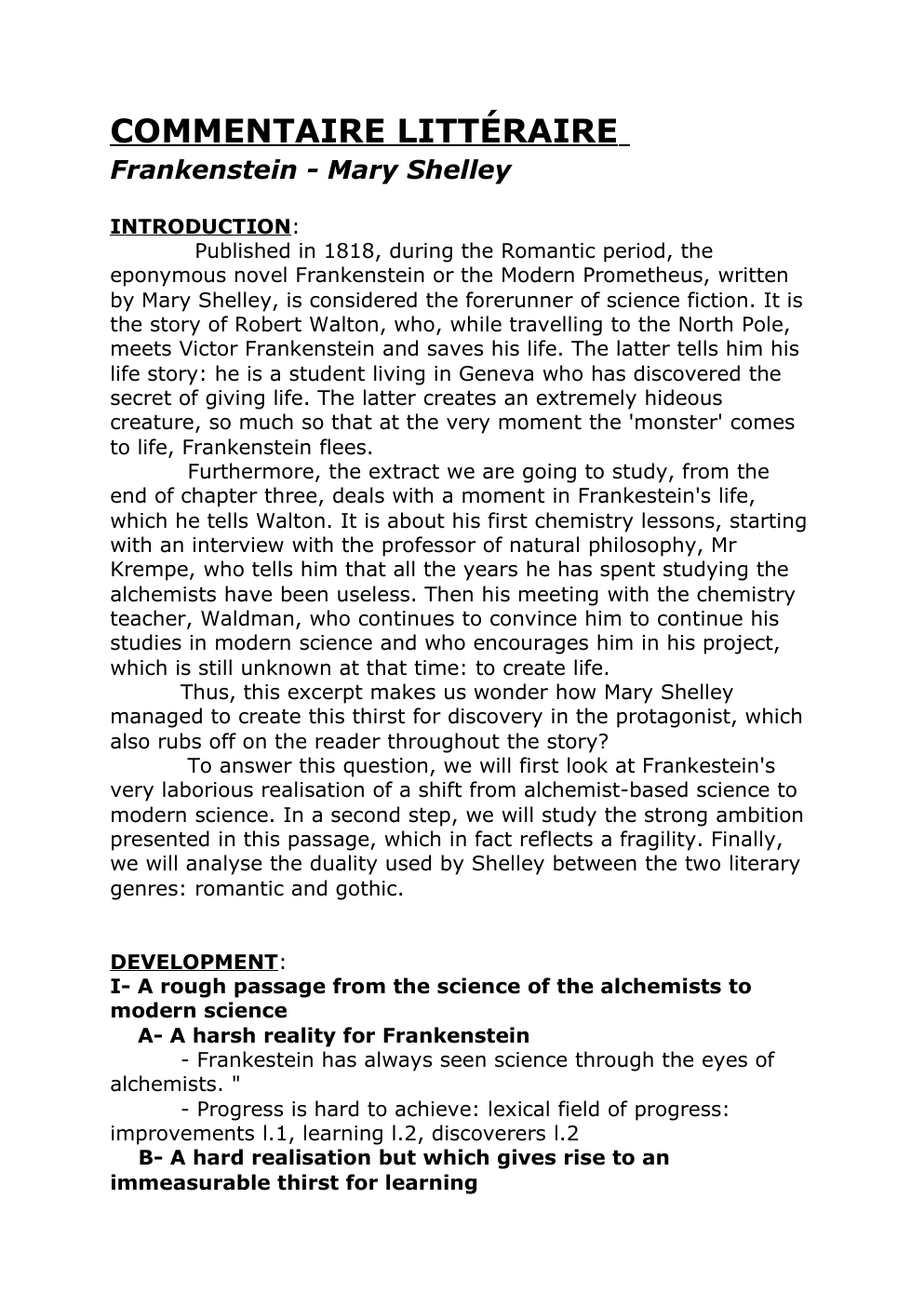COMMENTAIRE LITTÉRAIRE FRANKENSTEIN BY SHELLEY
Publié le 12/04/2023
Extrait du document
«
COMMENTAIRE LITTÉRAIRE
Frankenstein - Mary Shelley
INTRODUCTION:
Published in 1818, during the Romantic period, the
eponymous novel Frankenstein or the Modern Prometheus, written
by Mary Shelley, is considered the forerunner of science fiction.
It is
the story of Robert Walton, who, while travelling to the North Pole,
meets Victor Frankenstein and saves his life.
The latter tells him his
life story: he is a student living in Geneva who has discovered the
secret of giving life.
The latter creates an extremely hideous
creature, so much so that at the very moment the 'monster' comes
to life, Frankenstein flees.
Furthermore, the extract we are going to study, from the
end of chapter three, deals with a moment in Frankestein's life,
which he tells Walton.
It is about his first chemistry lessons, starting
with an interview with the professor of natural philosophy, Mr
Krempe, who tells him that all the years he has spent studying the
alchemists have been useless.
Then his meeting with the chemistry
teacher, Waldman, who continues to convince him to continue his
studies in modern science and who encourages him in his project,
which is still unknown at that time: to create life.
Thus, this excerpt makes us wonder how Mary Shelley
managed to create this thirst for discovery in the protagonist, which
also rubs off on the reader throughout the story?
To answer this question, we will first look at Frankestein's
very laborious realisation of a shift from alchemist-based science to
modern science.
In a second step, we will study the strong ambition
presented in this passage, which in fact reflects a fragility.
Finally,
we will analyse the duality used by Shelley between the two literary
genres: romantic and gothic.
DEVELOPMENT:
I- A rough passage from the science of the alchemists to
modern science
A- A harsh reality for Frankenstein
- Frankestein has always seen science through the eyes of
alchemists.
"
- Progress is hard to achieve: lexical field of progress:
improvements l.1, learning l.2, discoverers l.2
B- A hard realisation but which gives rise to an
immeasurable thirst for learning
- l.20 to 22: " I closes not my eyes that night.
[...] were as a
dream
- l.
34 to 39: " I listened to his statement [...] I ought to
procure
C- Frankestein shows immaturity
- Frankestein refuses the authority figure of Mr Krempe and
Waldman and wants to be right.
- Mr Waldman seen as a father figure-> reminds him to stay
away from the alchemists and to get closer to modern science + l.39
"I am happy [...] to have gaines a disciple" Frankestein seen as a
pupil and Waldman as his "instructor" (l.36) + l.46 to 50=
Waldman's benevolence, who wants to teach him and lends him his
"various machines" and his books (l.38)
TR= Frankenstein takes this news as a challenge.
He wants to prove
them wrong by developing his ambitious project of discovering all
the mysteries of science, especially those of creation.
II- An over-ambition which reflects a fragility
A- Science seen as a mystery to be solved
- l.18-19 "more, far more, will I achieve: treading in the steps
already marked, I will pioneer a new way, explores powers
[...]creation.
- Frankestein's science-> mystery to be probed; its secrets,
once discovered, must be jealously guarded.
- l.9-10 "They penetrate into the recesses of nature [...]
places.
B- An admiration which at the same time shows a rivalry
- considers M.
Krempe, the natural philosopher= "a coarse
man, but deeply penetrated by the secrets of his science".
- Waldman and Krempe= "palpable enemy" l.15
C- Ambitious but weak-minded
- Through Frankestein....
»
↓↓↓ APERÇU DU DOCUMENT ↓↓↓
Liens utiles
- Marie Shelley, Frankenstein.
- Marie Shelley, Frankenstein.
- Marie Shelley, Frankenstein.
- Marie Shelley, Frankenstein.
- Commentaire composé "Je vis, je meurs" Louise Labé







